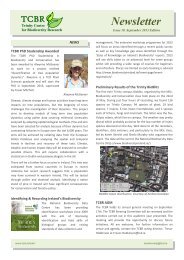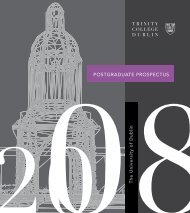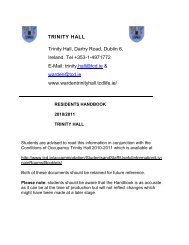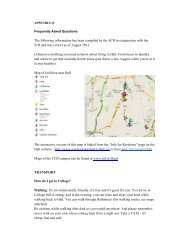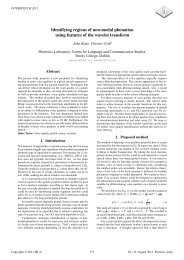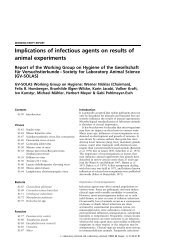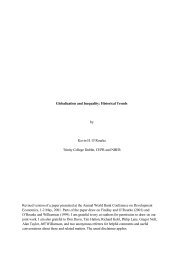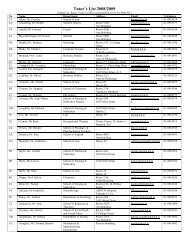Migration, crisis and the new global labour market.
Migration, crisis and the new global labour market.
Migration, crisis and the new global labour market.
Create successful ePaper yourself
Turn your PDF publications into a flip-book with our unique Google optimized e-Paper software.
<strong>Migration</strong>, Crisis <strong>and</strong> <strong>the</strong> New<br />
Global Labour Market<br />
Stephen Castles
Three stories – or four?<br />
1. The restructuring of <strong>labour</strong> <strong>market</strong>s in rich<br />
countries since <strong>the</strong> 1960s<br />
2. The welfare state: decommodification <strong>and</strong><br />
recommodification of <strong>labour</strong><br />
3. The <strong>global</strong>isation <strong>and</strong> hierarchisation of<br />
citizenship<br />
The overarching <strong>the</strong>me: <strong>the</strong> neo-liberal (counter)<br />
revolution<br />
4. The <strong>global</strong> economic <strong>crisis</strong>:<br />
• <strong>the</strong> end of neo-liberalism?<br />
2
Labour <strong>market</strong> restructuring: phase 1<br />
Expansion of manufacturing in core economies:<br />
1945-mid-1970s<br />
(The Fordist system)<br />
• Concentration of workers in large factories<br />
• Strong unions<br />
• Secure employment <strong>and</strong> improved wages<br />
• Welfare states to protect workers <strong>and</strong> families<br />
Migrant workers (guestworkers / colonial workers):<br />
– incorporated at lower levels<br />
– Secure though inferior legal status<br />
– Fairly good wages <strong>and</strong> welfare entitlements<br />
3
Labour <strong>market</strong> restructuring: phase 2<br />
Post 1973 ‘oil <strong>crisis</strong>’: <strong>global</strong> economic restructuring<br />
• New <strong>global</strong> investment strategy: capital export<br />
• Labour-intensive production moved to <strong>new</strong><br />
industrial areas in Global South<br />
• Decline of ‘rustbelt factories’ in Global North<br />
• Decline of blue-collar working class / unions<br />
• Reagan / Thatcher: neo-liberal attack on welfare<br />
Migrant workers<br />
– Guestworkers meant to leave – but stayed<br />
– Zero-immigration policies in Europe<br />
– New <strong>labour</strong> migrations in Asia, Gulf, etc<br />
4
Labour <strong>market</strong> restructuring: phase 3<br />
From 1990s: drivers of migration to Global North<br />
• Demographic: fertility decline <strong>and</strong> ageing<br />
• Social: young Europeans have more choice in<br />
education can reject menial work<br />
• Economic: need for <strong>labour</strong> of all skill levels<br />
• Globalisation: improved transport <strong>and</strong><br />
communications makes migration easier<br />
Migrant workers:<br />
– both high <strong>and</strong> low-skilled essential for high-tech<br />
industry, services, care work etc.<br />
– Migrants 12-25 % of workforce throughout Europe<br />
5
‘The riches are <strong>global</strong>, <strong>the</strong> misery is local’<br />
New <strong>global</strong> class structure based on right to be<br />
mobile (Zygmunt Bauman)<br />
• Free movement for highly-skilled / entrepreneurs<br />
• ‘Side-doors’ for medium-level skills<br />
– Workers with trade skills<br />
– Working holidaymakers<br />
• Temporary or ‘circular’ migration for low skilled<br />
– New guestworker systems (agriculture, catering)<br />
– Contract workers in Middle East<br />
• Irregular entry <strong>and</strong> employment:<br />
– preferred by many employers – <strong>and</strong> governments!<br />
• Exclusion of asylum seekers <strong>and</strong> refugees<br />
6
NYC: migration <strong>and</strong> <strong>the</strong> <strong>new</strong> economy<br />
Early 20 th century: rise of manufacturing<br />
– migrants from Sou<strong>the</strong>rn <strong>and</strong> Eastern Europe:<br />
– Garment, meatpacking, construction & transportation<br />
– Factories (sweatshops) in ethnic neighbourhoods:<br />
Little Italy, Lower East Side etc.<br />
– Strong unions –partly based on ethnic solidarity<br />
Early 21 st century: <strong>new</strong> economy<br />
– New migrations from Caribbean, Asia <strong>and</strong> Africa<br />
(often irregular)<br />
– Production jobs outsourced: Mexico, China, etc.<br />
– New jobs in retailing, personal services, etc.<br />
– Sub-contracting, casual work, informalisation<br />
– Fragmentation of ethnic solidarity<br />
7
The ‘<strong>new</strong> economy’<br />
Neo-liberal ideology: worker status <strong>and</strong> pay<br />
depend on ‘human capital’<br />
Fragmentation of employment:<br />
– Privileged formal sector for natives <strong>and</strong> highly-skilled<br />
– Informalisation – e.g. catering, retail, care work<br />
– Casualisation for women, youth, migrants<br />
– Sub-contracting – e.g. construction, drivers<br />
Labour <strong>market</strong> segmentation based on:<br />
– Gender<br />
– Age / location<br />
– Origins <strong>and</strong> legal status<br />
– Race/ ethnicity<br />
8
Citizenship <strong>and</strong> <strong>the</strong> welfare state:<br />
DE-commodification<br />
Rise of welfare regimes 1945-70s:<br />
– Anglo-American liberal regime<br />
– Conservative central <strong>and</strong> Sou<strong>the</strong>rn European corporate regime<br />
– Sc<strong>and</strong>inavian social-democratic regime<br />
Varying levels of de-commodification of <strong>labour</strong>:<br />
• Social citizenship as a basic right<br />
– Even in <strong>the</strong> USA: from New Deal to Great Society<br />
• Welfare rights allowed working class to reject menial<br />
work <strong>and</strong> exploitation<br />
• Differing welfare regimes linked to variations in Fordist<br />
production <strong>and</strong> industrial relations regimes.<br />
9
Citizenship <strong>and</strong> <strong>the</strong> welfare state:<br />
RE-commodification<br />
• Neo-liberal roll-back of welfare state since<br />
1970s, linked to restructuring of <strong>global</strong> economy<br />
• Re-commodification of <strong>labour</strong> through:<br />
– Workfare regimes<br />
– Differentiation of ‘deserving’ <strong>and</strong> ‘undeserving’ poor<br />
– Differentiation on <strong>the</strong> basis of gender, race/ethnicity<br />
<strong>and</strong> legal status<br />
• Racialisation as:<br />
– Instrument of differentiation of <strong>labour</strong> force<br />
– Legitimation of inequality <strong>and</strong> impoverishment<br />
10
Globalisation of <strong>the</strong> nation-state<br />
• The nation-state as a <strong>global</strong> norm:<br />
– 50 nation-states in 1945<br />
– 192 today<br />
• But nation-state has less control of<br />
boundaries<br />
– Cross-border flows as part of <strong>global</strong>isation<br />
• State control of economy, welfare <strong>and</strong> culture<br />
eroded<br />
• Growth in international migration <strong>and</strong> multiethnic<br />
populations<br />
• Unitary nation-state belonging questioned:<br />
– multiple identities, transnational communities<br />
11
Hierarchical citizenship<br />
Most of <strong>the</strong> world’s people are citizens – for <strong>the</strong><br />
first time in history.<br />
Citizenship equal in name but hierarchical in<br />
fact:<br />
– US citizens<br />
– Citizens of o<strong>the</strong>r western states<br />
– Intermediate <strong>and</strong> transit countries<br />
– Poorest states<br />
– Non-citizens – ‘unlawful persons’<br />
Everybody has a passport –<br />
but not all passports will allow you to cross borders<br />
12
Hierarchies of citizenship:<br />
within nation-states<br />
Citizens <strong>and</strong> nationals<br />
– Members of <strong>the</strong> formal economy<br />
– The working poor<br />
– The undeserving poor<br />
Denizens: migrants with jobs <strong>and</strong> acquired rights<br />
Excluded migrants <strong>and</strong> minorities:<br />
– Marginal employment (casual, temporary, subcontracting)<br />
– Differentiated on <strong>the</strong> basis of gender, race/ethnicity,<br />
origins, legal status<br />
Asylum seekers <strong>and</strong> irregular migrants<br />
15
Hierarchies of citizenship:<br />
between nation-states<br />
between North <strong>and</strong> South<br />
• ‘Naturalisation’ of inequality, chaos <strong>and</strong> ethnic<br />
violence:<br />
– Some peoples labelled as incapable of building<br />
modern states <strong>and</strong> economies<br />
– Economic <strong>global</strong>isation as <strong>new</strong> ‘civilising mission’<br />
– Poverty of some groups is inevitable<br />
• Transnational racism<br />
– Migrants from South as threat: terrorism, crime,<br />
disease<br />
– Legitimates border restrictions<br />
16
New social movements<br />
NEW SOCIAL MOVEMENTS:<br />
Dubai 21 March 2006<br />
17
hhouli who was killed with a friend in a motorbike crash with a police car that caused riots,<br />
ed through Villiers-le-Bel carrying a banner at <strong>the</strong> front of <strong>the</strong> funeral procession that dema<br />
15. Vast deployments of riot police restored calm to <strong>the</strong> troubled suburbs of nor<strong>the</strong>rn Paris<br />
18<br />
Paris: 29 November 2007
Nashville, Tennessee, 29 March 2006<br />
19
Political dilemmas of <strong>the</strong> <strong>new</strong> social<br />
movements<br />
• Not led by left parties<br />
• Ambivalent role of trade unions<br />
• Traditionalism <strong>and</strong> opposition to modernity<br />
– Religious factors<br />
– Cultural factors<br />
– Fundamentalism <strong>and</strong> violence<br />
• Fragmentation of ‘single issue’ movements<br />
• Mistrust of left:<br />
20
Global financial <strong>crisis</strong> <strong>and</strong> migration<br />
Short-term<br />
• Return migration of some groups<br />
– e.g. Poles from UK <strong>and</strong> Irel<strong>and</strong><br />
• Reduced migration from South to North<br />
– Fewer Filipinos applying to migrate<br />
• Declines in irregular migration (e.g. Mexico-USA)<br />
• Reduced remittances by migrants to home countries<br />
• Increased hostility to migrants in some host countries<br />
– E.g. UK: Strikes against foreign workers<br />
• Reduced recruitment of foreign workers<br />
– E.g. South Korea: official stop to recruitment<br />
21
Global financial <strong>crisis</strong> <strong>and</strong> migration<br />
Economic crises as migration turning points<br />
• World Economic Crisis of 1930s:<br />
– Sharp decline in migration<br />
– Considerable return migration - often forced (USA, France)<br />
– But many migrants stayed <strong>and</strong> settled permanently<br />
• Oil <strong>crisis</strong> 1973<br />
– Many migrants failed to leave – despite unemployment<br />
– Turning point from <strong>labour</strong> migration to permanent settlement<br />
– New industrial areas <strong>and</strong> <strong>new</strong> forms of migration<br />
• Asian Financial Crisis 1997-99<br />
– Few long-term effects on migration<br />
KEY ISSUE: does <strong>crisis</strong> lead to fundamental change in<br />
<strong>global</strong> economic strategy?<br />
22
The <strong>global</strong> economic <strong>crisis</strong>:<br />
End of <strong>the</strong> neo-liberal dream?<br />
• Short-term interruption to neo-liberalisation <strong>and</strong><br />
<strong>global</strong>isation?<br />
• Or major structural <strong>crisis</strong>, that will lead to fundamental<br />
changes in <strong>global</strong> economy, politics <strong>and</strong> social relations?<br />
A warning: Karl Polanyi’s Great Transformation<br />
• 19 th century <strong>market</strong> liberalism meant<br />
disembedding of economy from society<br />
• Result: a societal <strong>crisis</strong> fascism <strong>and</strong> war<br />
• Globalisation as a <strong>new</strong> Great Transformation?<br />
– But of <strong>the</strong> whole world this time<br />
23
THE END<br />
Thank you for your attention<br />
24



